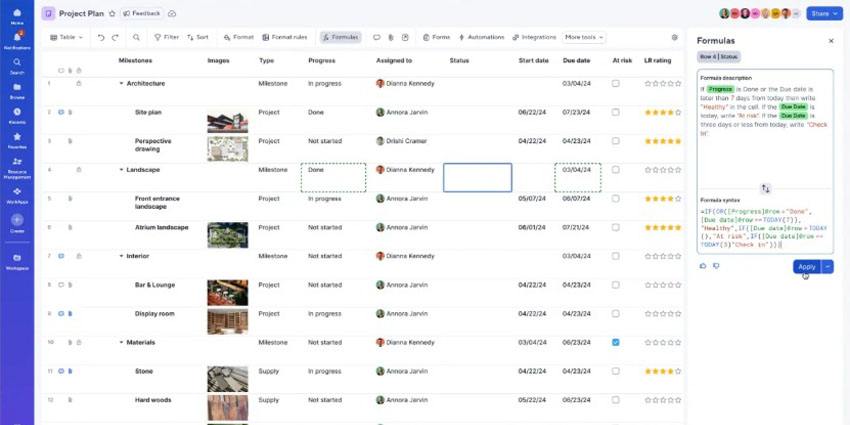In possibly Smartsheet’s most significant platform evolution to date, the company has rolled out a wave of updates that bring intelligent automation, AI-driven insights, and serious infrastructure improvements to the forefront.
Smartsheet pitches this as more than just a product refresh; it is outlined as a statement of intent. The work management platform stresses that it wants to be the ecosystem where work happens, flows, and scales. This release potentially lands at the right moment for IT leaders under perennial pressure to do more with less.
Smartsheet’s Big Pitch: AI That Actually Helps
In 2025, AI is everywhere, but Smartsheet is betting on AI that’s tangibly useful. Its latest tools are designed not just to automate the basics, but to make work authentically easier to manage across complex, fast-moving organisations.
One standout feature is AI-powered formula generation, which takes the friction out of building logic into your workflows. Instead of wrestling with syntax, users can focus on outcomes. Add in automated chart creation and a new knowledge graph that understands the relationships between your people, projects, and data, and you’ve got a platform that can now make intelligent suggestions about what to do next, whether assigning a task or sharing a dashboard.
New users also get a smarter onboarding experience, with AI-guided project setup that helps teams go from blank slate to working plan in minutes. Meanwhile, the redesigned table view brings smoother scrolling, bigger data capacity, and new touches like column linking and simplified cross-sheet referencing, all built on top of a more robust architecture designed to support large-scale enterprise workloads.
Smartsheet has also teased a new dashboard widget for timeline views, giving users a clearer way to map project phases, milestones, and metrics in one place. And later this year, scenario planning will let teams compare project plans side-by-side, stress-test resources, and spot problems before they become blockers.
It’s all aimed at a single goal: helping teams move faster without losing sight of the big picture.
Pratima Arora, Chief Product Officer at Smartsheet, wrote in an accompanying blog:
Smartsheet is rethinking how work flows — across teams, tools, and time zones — to help people move faster, think more strategically, and do their best work. We’re building not just a work platform, but AI-powered, enterprise-grade work management.”
Why This Matters for IT Leaders and Tech Buyers
What’s striking about this update is that Smartsheet is aspiring to deliver a vision that aligns with the messy, real-world challenges of actual, nuts-and-bolts work.
For IT leaders, this shift couldn’t come at a better time. Budgets are tight, expectations are high, and the disconnect between strategy and execution is still a perpetual headache. Smartsheet’s new direction seeks to offer something refreshingly grounded: tools that don’t just claim to be smart but tangibly help teams cut through complexity and deliver results.
The knowledge graph, for instance, shows major promise for addressing visibility issues that particularly plague large, decentralised organisations. It brings contextual awareness to project management, making it easier to find what matters, when it matters.
Equally important is the back-end work. The platform’s upgraded architecture signals a focus on long-term scalability and reliability, essential for IT teams who need to ensure tools work for today’s projects and tomorrow’s growth. The inclusion of agentic AI, with a transparent stance on data privacy and governance, shows Smartsheet understands the enterprise audience it’s building for.
Perhaps most compelling is the platform’s ability to bridge planning and execution. Too many work management tools either focus on strategic reporting or task-level tracking. Smartsheet’s scenario planning and timeline visualisation aim to do both, helping decision-makers test ideas and then turn them into action without switching platforms.
This isn’t a work management revolution, but it’s a smart, well-paced evolution that shows Smartsheet is growing into its role as a serious enterprise contender. For CIOs and buying committees exploring how to modernise work and streamline operations, this release deserves a closer look.
Smartsheet to Elevate Digital Transformation and Work Management for PwC Clients
Earlier this summer, PwC UK entered a strategic partnership with Smartsheet, aiming to help large organisations better manage complex transformation efforts. Announced at the Smartsheet Summit in London, the partnership will initially target key UK sectors, including government and financial services, where large-scale change initiatives are often layered and high-stakes.
The collaboration is already gaining traction, with a strong pipeline of enterprise engagements underway, notably including one of the UK’s largest transport infrastructure organisations.
PwC plans to bring its sector-specific insight and consulting expertise to the table, supporting clients as they implement Smartsheet’s platform to manage programmes, projects, and operational processes at scale. The goal is faster execution, greater visibility, and more strategic impact from every transformation initiative.







